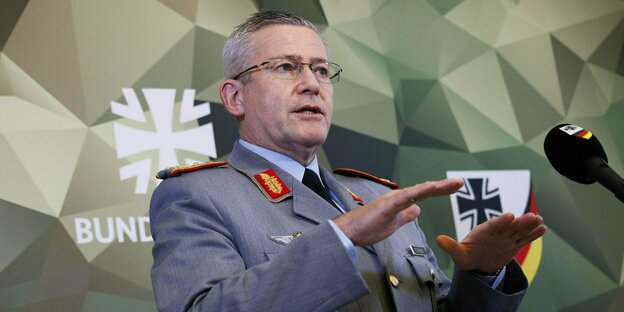If Germany is attacked, Bundeswehr regiments are supposed to protect the infrastructure. For this, more soldiers are needed, demands Commander Bodemann.

Commander André Bodemann believes that the Bundeswehr needs more soldiers to “protect the homeland.” Photo: Carsten Koall/dpa
SEDAN dpa | According to Lieutenant General André Bodemann, in the future there will have to be “many more” soldiers in National Security for military security tasks and the protection of the infrastructure itself. “Six national security regiments are not enough to protect the important defense infrastructure if I want to protect it exclusively with national security,” Bodemann, commander of the Bundeswehr Territorial Command, told the German Press Agency in Berlin.
The general and his command are close to completing a first version of Germany's operational plan (“OPLAN”), which will reorganize the defense for the first time since the Cold War. A first version of the document, which is top secret and contains hundreds of pages, is expected to be ready at the end of March.
The Bundeswehr will create six national security regiments by 2027, which will include approximately 6,000 men and women. In peacetime, they can be used for official relief and in disaster relief, from serious accidents to terrorist situations and pandemics. In case of tension and defense or even in case of crisis, national security forces also secure and protect ports and railway facilities, freight transshipment points, oil pipelines, roads for troop deployment, bridges, transportation hubs and digital infrastructure .
“It's also about how much national security I need and what capabilities to protect it. And not just with guns and barbed wire,” Bodemann said. “It's about drone defense capabilities and jamming options.” Observation options are important. He mentioned sensors, optronics and cameras “to using artificial intelligence to filter information and say: something is happening here.”
Long waiting list for national security regiments
Military planners also analyze how cooperation with police, civil protection and emergency services should work in case of stress and defence. Economic sectors such as logistics and energy are also involved. One assumption is that significant parts of the Bundeswehr are needed in an emergency on NATO's eastern flank and are therefore not available in Germany.
The Bundeswehr has noticed that many people are interested in national security, Bodemann said. “Unfortunately, we can't get people into the system that quickly.” And interest varies by region. In North Rhine-Westphalia, in the Münster National Security Regiment, there are around 1,000 people on the application list.
Bodemann said that with the first copy of the operation plan, the command was “right now in the home stretch.” This plan is already “applicable”, but will be continually updated. To do this, the Bundeswehr also depends on more information from allies about the support it will receive if troops are deployed. Due to its geographical location, Germany is considered a NATO “hub.”
“We are already very advanced in identifying critical and important infrastructure for defense. How we protect them is now the second step. We also address this with the operational plan,” said Bodemann. A big problem is transportation infrastructure. “It's no secret that we still have deficits in Germany,” Bodemann said. “What critical transportation infrastructure needs to be improved? That is one of the challenges. We all know: improving bridges and building new bridges and tunnels costs a lot of money.”
Cooperation between the different forces is central. “The better connected we are, the sooner we can detect threats and the better we can protect against them,” says Bodemann. This affects the military, but also the police and the Office for the Protection of the Constitution, as well as all the “sensors we have in Germany.” This applies “already now, that is, under a state of war, a case of tension or a case of defense, of NATO Article 5, because we are already seeing threats.”
Bodemann will send the operational plan to Inspector General Carsten Breuer, along with an assessment of the need for action. To a question, Bodemann replied: “I don't have the operation plan printed, but I will send it to the Ministry through secret lines at the end of the month.” and civil authorities in some regions will be subjected to a practical test: “We want to subject this operation plan to a so-called stress test.”